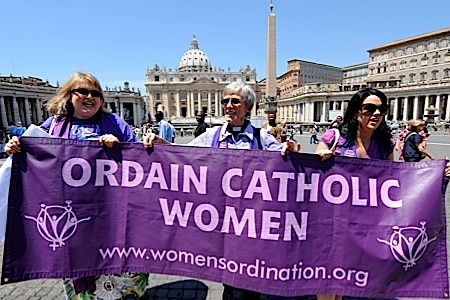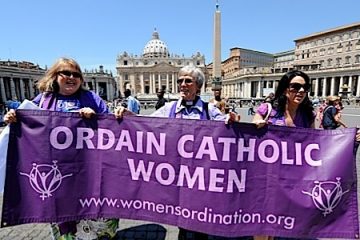
by Mary Ellen Robertson
(originally posted at Feminism and Religion)
If I see a flaw in contemporary Mormon feminism, it’s that we haven’t ventured outside our own religious community to partner with other religious feminist activists. Working separately or in ignorance of the work already done by other religious feminists, we’re more likely to spend time reinventing the wheel than building upon the lessons learned.
Fortunately, there’s an exciting shift afoot.
Last week, Catholic and Mormon women came together for a dialogue on women’s ordination. Hosted by Claremont Graduate University, this discussion brought together six women from patriarchal religions to explore what happens when we call an all-male priesthood into question and examine the theological and cultural assumptions upon which an all-male priesthood rests.
Karen Jo Torjesen opened with an overview of the ecclesiastical leadership roles women held in the earliest centuries of primitive Christianity.
Victoria Rue, an ordained Roman Catholic Womanpriest, spoke about the canon law cited to deny ordination to women, the need for transformation in the Catholic Church, and advocated a radical inclusivity wherein women and men and all sexualities represent Christ in a discipleship of equality.
Lorie Winder reviewed the LDS concept of Mother in Heaven, a God who wants to share spiritual authority with us, and the incongruous framing of motherhood as equal to priesthood. She asked, “Isn’t it about time to lay aside the tortured logic and rigid gender roles that keep us from seeing each other as we are: brothers and sisters, colleagues and friends, inching together toward sainthood?”
Christine Haider-Winnet talked about her call to ministry and the questions of who will ordain her or hire her when she finishes her seminary studies and seeking a community that will nurture her gifts. Christine thanked Catholic women who are blazing trails, advocating for women’s ordination, and standing in solidarity with others who want more gender equality in their churches.
Jennifer O’Malley, who is about to be ordained a Roman Catholic Womanpriest, proposed new thinking about the sacrament: celebrating it as a gift rather than something received passively. This creates a world where the dignity and fullness of women and men are acknowledged.
My remarks focused on glimmers of women’s empowerment in early Mormon history, when Mormon women used gifts of the spirit to anoint, bless, and heal the sick. Since there’s no arena within the current LDS Church for these gifts, I feel called to nudge the church I care about to return to its more equal and inclusive roots.
Margaret Toscano called ordination the most divisive issue among Mormon feminists. Mormon women are reluctant to claim spiritual power out of concern that they’ll be seen as power hungry rather than seeing an opportunity to bring out the best in each other.
We asked “How can we help each other in advocating for ordination and expanded roles for women?” The ensuing dialogue was momentous. Catholic and Mormon feminists share a deep love and respect for our religious communities; a common mission to advocate for practical, equitable, and inclusive changes; and a call to ministry so that women’s spiritual gifts and power can flourish and enrich the larger community.
Being aware of each other’s concerns, becoming versed in each other’s prior activism, and working together can help swing the pendulum toward equality in both traditions. This collaborative work transforms us and moves all of us along the path toward wholeness and equality.
Mary Ellen Robertson attended Brigham Young University as an undergrad, which had the unintended consequence of turning her into a confirmed feminist. She earned a master’s degree from Claremont Graduate University in Women’s Studies in Religion. Mary Ellen is Interim Executive Director of the Sunstone Education Foundation, a non-profit organization based in Salt Lake City dedicated to independent Mormon Studies. The organization publishes SUNSTONE magazine.






12 Responses
Wow, this is so encouraging! Thanks for the post, Mary Ellen!
Thanks, Ziff! It was a powerful and energizing discussion that began over dinner with the panelists and carried through to a Q&A session that could have continued for several hours more.
Mhana, I appreciate your thoughts. To me, priesthood isn’t about self-serving power; it’s about using one’s spiritual spiritual gifts to bless and minister to others. To comfort those who stand in need of comfort. And to give women a voice in discussions and decision making that affects them.
I’ve been thinking about the “but I don’t want the priesthood!” remark which I can in a way understand. Church is already exhausting with children — do you want to make it hours longer by attending meetings generally only men do? Do you want MORE work, MORE responsibility. Of course for many the answer is still yes. But to me the question isn’t whether do I want to be Bishop (I certainly do not) but whether I want to be led by men and women. If I were excommunicated, would I want to be the only woman in the room? No. If I had to confess intensely personal sins, would I want to do it to a man, describe it to a man? No. When the Bishopric decides it is a good idea to have all ward members regularly host dinners to build unity, would I be happier of more women had their voices in that? Of course. After all, it is women who will be cleaning the house and cooking the meal and being the gracious hostess. I’d be a lot happier if I thought the program were shaped by those voices. Wanting the priesthood isn’t about a power grab for me. When we talk about the ecclesiastical authority it brings, it isn’t that I personally want to hold those offices, any more than I want to be the YW president. But I would like to be led by women.
I wish I could have been there! I am curious if Catholics encounter the same issues Mormons do, and if so, how they address them. I would imagine, since Catholics do not ordain every male member like Mormons do, women who “don’t want the responsibility of the priesthood” would not be an issue. However, in the Catholic faith, is it considered taboo to even mention a hope for female ordination, like among Mormons? Do Catholic women insist that they don’t “feel unequal” like Mormon women do? Do Catholics talk about how the female potential for motherhood somehow makes priesthood unnecessary? I am also wondering if it is any easier for Catholics because in the Catholic tradition, some women are revered as Saints, whereas I cannot think of any way a Mormon woman would ever be revered like a male Mormon apostle or prophet.
April,
I grew up in an Italian Catholic household. Its not the same, because as you stated, not every male has the priesthood. Only males who have gone thru seminary training can be ordained priest. Catholic women could be getting more progressive, but, I haven’t really come across any blogs suggesting that they want priesthood, nearly as much. Just, that they want more social justice and for the Vatican to stop insisting itself with American Nuns to get back to the more traditional roles that nuns perform. The Vatican wants these Nuns ( who are now doctors, lawyers, etc) to not teach about birth control, etc. And these nuns are like, that wouldn’t work here and they feel they have a responsibility to the current culture.
For some reason certain issues are just not discussed, not because they are taboo, but, rather because the Catholic church (and its hierarchy) isn’t nearly as entrenched in the normal every day Catholics life, quite the same way that it is for the average Mormon/ Mormon family. It a small difference, but, a major nuance, I’m not sure if I can verbally explain it. Catholics go to church, just like Mormons, but, there is not the cultural aspect of the church like it is in Mormonism.
With regard to your question of saints, I’m not really sure how that would pertain to the issue, saints are labeled saints because of some great miracle that they have performed (which can be proved and verified) . There is a whole committee within the Vatican that verifies the process.
I’m not sure if I answered your question, but, its really hard to put it into words
I’m so glad for the report. I had hoped to make it.
Is there a place online where one can access the talks given at this conference? Are there plans to do more collaborative work?
Such exciting and important work!
Yes, I hear that they will put this online in a couple of weeks. And there are more plans for collaboration. I believe some panelists were talking of creating a Catholic/Mormon feminist facebook group and perhaps some kind of publication together.
April
Depending on where you live it may be too late, but, PBS is running a special on Catholicism it may or may not answer your questions.
I like this post. I had a wonderful opportunity to have a very good friend perform Reiki on me. She put her hands on my head and said some amazing things that I know God wanted me to hear. There are different ways to do reiki, but it felt wonderful to have a woman that I love, trust, and respect put her hands on my head and hear a beautiful message from my Heavenly Parents.
[…] Robertson is the executive director of the Sunstone Education Foundation. She is also part of an interfaith activist group comprised of female activists seeking the ordination of female clergy. […]
[…] Robertson is the executive director of the Sunstone Education Foundation. She is also part of an interfaith activist group comprised of female activists seeking the ordination of female clergy. […]
[…] Robertson is the executive director of the Sunstone Education Foundation. She is also part of an interfaith activist group comprised of female activists seeking the ordination of female clergy. […]